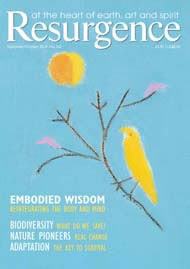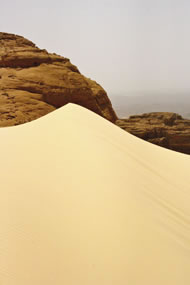Thirteen years old: I am standing in the south of Morocco gazing towards the edge of the Spanish Sahara. What is that shimmering on the horizon? I am looking away from the known world towards something edgy, exciting, empty, essential.
And then, two weeks before I leave for Sinai at the invitation of Makhad Trust, an old friend in New Mexico phones me on his way to a Zen retreat and tells me how in Islam there is a story where, having created everything in the world, God leaves one place for himself.
The journey from the airport at Sharm el-Sheikh is a passage in itself. Surrounded by fake green and more lawn sprinklers than you have ever seen, our minibus with its Bedouin driver heads out into the desert, the road initially flanked by pylons, the central reservation littered with random rubbish. Then gradually as the light fades, it all falls away. And we realise (our small retreat group of eight, attending Desert Feast run by Danny Shmulevitch, with Resurgence’s Satish Kumar attending as its special guest) that we are about to spend a week outdoors without electricity and most of our usual comforts. We secretly hang on to our mobiles, or (just as rigorously) abandon them.
Eighty miles or so later, we reach somewhere. Two jeeps are waiting. The luggage is shifted. Then we are driving who knows where, out into the open sand, both drivers suddenly and crazily accelerating spontaneously to avoid the wheels getting snagged. It is exhilarating. It is surreal.
The first experience of the silence (particularly under moonlight, greeted by Danny wearing mostly white) is unforgettable. It’s like a soft hiss, spacious, resonant; within and beyond the sound you also realise is the blood in your ears. And the spectral shapes of the ancient rocks, whose deeply furrowed surfaces so nearly resemble creatures of all sorts, poised in stillness and a profound peace. And suddenly there’s nowhere else to go.
After a 20-minute walk on rock and sand, the camp waits below: a beautiful woven Bedouin tent ringed by candles marking the rocky natural bedrooms under the stars that are our resting places. Bedouin hospitality is central to their days. The fire in the ring of stones, the slow-burning acacia log like a giant cigar (wood is scarce out here), the blackened kettle with its sweet red hibiscus tea... and later the cry of “SOUP!” followed by a simple rice dish; all as we sit cross-legged with candles in sawn-off plastic water bottles weighted with sand. Nothing is wasted.
Danny is articulate about the Bedouin sense of freedom despite the Egyptian authorities (Sinai does not feel like Egypt in any other sense). He quotes his friend Farrag: “We have no electricity, no water, no education – and yet we are free.” Bushmen and the Aborigines are relegated by authorities because they can’t be controlled. They are also unconsciously envied.
Makhad’s work through Danny is establishing a school at nearby Nawamis, which is part of a bigger vision he has around a centre for conflict resolution. Funds of course are needed. The wilderness trips all contribute.
And we receive something invaluable from the Sinai that is beyond price, encoded in this extraordinary landscape that was once under water, beyond the geological rift that stretched either side of its peninsula into being drained, leaving mile after mile of empty valley, hillside, mountain and dune ceaselessly shaped by wind, sand and sun. God’s invisible hands in God’s country, where Moses and the Israelites came through Purgatory towards the Promised Land. The very openness of everything everywhere invites an openness in us, as well as sharing with a notable transparency as a group relatively quickly. Our lives may be full of noise and clutter, but they are also precious in all this space and emptiness.
Danny takes us walking as part of an induction process before the central part of the week, the context of why you might want to eat nothing for 72 hours when you thought you were on holiday. Barring illness, the process is not at all as intimidating as you might fearfully think: it is a natural detox for the body that is also strengthening and regenerating; but above all it leaves a space where the Self, the More Than, can enter in. It will also focus whatever our inner process is, with its accompanying challenges, as well as inviting us into the necessity of self-care. Most of all it invites us to trust – in a way we may not at all be used to because of our cultural (and medical) conditioning – self-healing. Actually, trusting life itself.
We return to the wilderness, to an absolute encounter with our environment in days that – framed by silence – expand out of all recognition. A fasting day can feel like three. And the starlit nights, with the stars clear as precise points of light... all of it held in the same primordial spacious calm silence, a silence that has virtually vanished from our world and our experience, which is something we know in our bones to be true and essential. And slowly over the three days, we are closer to the pure consciousness that is also truly here and now, present to its presence. My own practice as a poet, with camera, recording equipment and journal, is to enter into the spirit of the place.
And at the end of each day, the ritual of the meeting tent (the makhad) awaits.
Then the fast is finally broken. We move on into an unforgettable wilderness walk along the Exodus route on foot, with all its contours and alternations between hardness and softness, sandstone hill and dune, granite and silica. Next morning we continue our journey until we have less than an hour before we board the minibus to leave. We’ve even washed in the sand (it is remarkably cleansing), and the desert dust is on our boots and clothing. And our eyes are bright with the light as well as with all we’ve seen.
There is an aliveness that is purely light, an innocence, a freedom that we can touch beyond bright lights and constant addictive stimulation... that is the gift of being here, as it is in being anywhere our bodies are allowed to be in their natural ecology.
The gift of the desert then is an expansion. Freed from our busy contracted (or preoccupied) minds, where we can truly find our hearts again... even as our shadows walk with us?
For further information on the Makhad Trust and retreat journeys visit www.makhad.org








